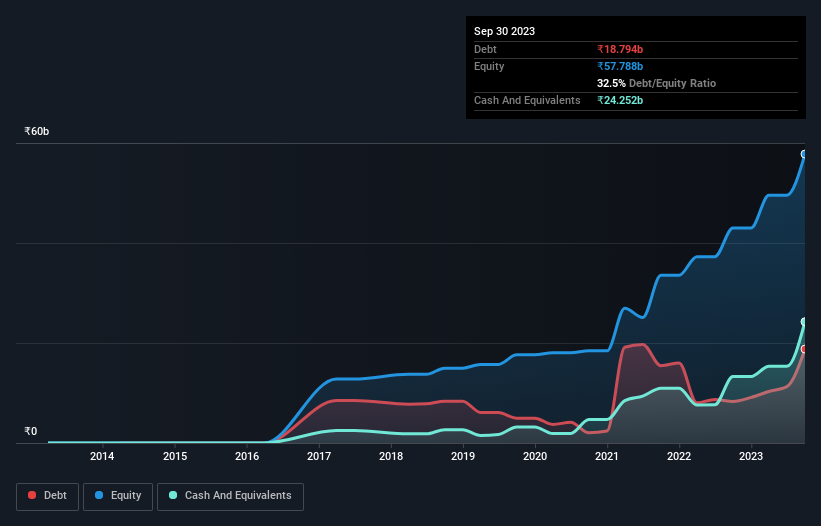
Warren Buffett famously said, 'Volatility is far from synonymous with risk.' So it might be obvious that you need to consider debt, when you think about how risky any given stock is, because too much debt can sink a company. We can see that Tube Investments of India Limited (NSE:TIINDIA) does use debt in its business. But should shareholders be worried about its use of debt?
When Is Debt A Problem?
Generally speaking, debt only becomes a real problem when a company can't easily pay it off, either by raising capital or with its own cash flow. Part and parcel of capitalism is the process of 'creative destruction' where failed businesses are mercilessly liquidated by their bankers. While that is not too common, we often do see indebted companies permanently diluting shareholders because lenders force them to raise capital at a distressed price. Of course, plenty of companies use debt to fund growth, without any negative consequences. The first step when considering a company's debt levels is to consider its cash and debt together.
View our latest analysis for Tube Investments of India
How Much Debt Does Tube Investments of India Carry?
The image below, which you can click on for greater detail, shows that at September 2023 Tube Investments of India had debt of ₹18.8b, up from ₹8.31b in one year. However, its balance sheet shows it holds ₹24.3b in cash, so it actually has ₹5.46b net cash.

How Strong Is Tube Investments of India's Balance Sheet?
Zooming in on the latest balance sheet data, we can see that Tube Investments of India had liabilities of ₹49.8b due within 12 months and liabilities of ₹15.3b due beyond that. On the other hand, it had cash of ₹24.3b and ₹24.9b worth of receivables due within a year. So it has liabilities totalling ₹15.9b more than its cash and near-term receivables, combined.
Of course, Tube Investments of India has a market capitalization of ₹753.8b, so these liabilities are probably manageable. However, we do think it is worth keeping an eye on its balance sheet strength, as it may change over time. Despite its noteworthy liabilities, Tube Investments of India boasts net cash, so it's fair to say it does not have a heavy debt load!
And we also note warmly that Tube Investments of India grew its EBIT by 13% last year, making its debt load easier to handle. The balance sheet is clearly the area to focus on when you are analysing debt. But ultimately the future profitability of the business will decide if Tube Investments of India can strengthen its balance sheet over time. So if you're focused on the future you can check out this free report showing analyst profit forecasts.
Finally, while the tax-man may adore accounting profits, lenders only accept cold hard cash. While Tube Investments of India has net cash on its balance sheet, it's still worth taking a look at its ability to convert earnings before interest and tax (EBIT) to free cash flow, to help us understand how quickly it is building (or eroding) that cash balance. In the last three years, Tube Investments of India's free cash flow amounted to 40% of its EBIT, less than we'd expect. That weak cash conversion makes it more difficult to handle indebtedness.
Summing Up
While it is always sensible to look at a company's total liabilities, it is very reassuring that Tube Investments of India has ₹5.46b in net cash. And it also grew its EBIT by 13% over the last year. So we don't have any problem with Tube Investments of India's use of debt. Above most other metrics, we think its important to track how fast earnings per share is growing, if at all. If you've also come to that realization, you're in luck, because today you can view this interactive graph of Tube Investments of India's earnings per share history for free.
Of course, if you're the type of investor who prefers buying stocks without the burden of debt, then don't hesitate to discover our exclusive list of net cash growth stocks, today.
Valuation is complex, but we're here to simplify it.
Discover if Tube Investments of India might be undervalued or overvalued with our detailed analysis, featuring fair value estimates, potential risks, dividends, insider trades, and its financial condition.
Access Free AnalysisHave feedback on this article? Concerned about the content? Get in touch with us directly. Alternatively, email editorial-team (at) simplywallst.com.
This article by Simply Wall St is general in nature. We provide commentary based on historical data and analyst forecasts only using an unbiased methodology and our articles are not intended to be financial advice. It does not constitute a recommendation to buy or sell any stock, and does not take account of your objectives, or your financial situation. We aim to bring you long-term focused analysis driven by fundamental data. Note that our analysis may not factor in the latest price-sensitive company announcements or qualitative material. Simply Wall St has no position in any stocks mentioned.
About NSEI:TIINDIA
Tube Investments of India
Engages in the manufacture and sale of precision engineered and metal formed products to automotive, railway, construction, agriculture, etc.
Excellent balance sheet with questionable track record.

